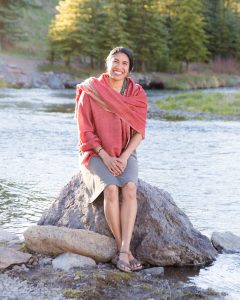Erika Zavaleta is an interdisciplinary scientist that has worked her career to make her research accessible, has broken down barriers for biologists of color, and is seen by many to be a trailblazer in her field. Zavaleta is a community and ecosystem biologist at the University of California Santa Cruz (UCSC) that focuses on global and regional environmental change, ecosystem functioning, and effective stewardship. She uses environmental policy, economics, anthropology, and outreach as tools to communicate her research to a larger audience as a scientist that aims to make the field accessible. She received her bachelor’s and master’s in anthropology and Ph.D. in biological sciences at Stanford University. Dr. Zavaleta is a Howard Hughes Medical Institute Professor in the Ecology and Evolutionary Biology department at UCSC. She is an appointed California Fish and Game Commission science advisor, an Ecological Society of America (ESA) “Excellence in Ecology Scholar,” ESA fellow, and a fellow of the California Academy of Sciences. Dr. Zavaleta has also co-authored over 75 papers and book chapters in the fields of conservation, ecology, and social sciences. In 2021, she received the Commitment to Human Diversity in Ecology Award from ESA due to her devotion to highlighting the voices of low-income, Indigenous, Black, and Latino backgrounds in the ecology and conservation field.

Dr. Zavaleta’s Conservation Science and Solutions Lab is interested in questions related to ecological responses to climate change, changes in biodiversity due to environmental variability, and conservation-based approaches to mediate these impacts. Some research projects currently taking place by her lab members are the impacts of land and water use changes on bat ecological communities, the impacts of community-led forestry conservation efforts in Brazil and Nepal, and the effectiveness of current conservation efforts in response to climate change. Through this research, Zavaleta’s group works to act as a link between ecology theory and research to develop and recommend effective conservation and management practices. The lab places an emphasis on collaborating with community partners, approaching research through a multidisciplinary lens, and furthering initiatives that promote inclusivity in the field of conservation and biology.
Zavaleta’s lab has supported initiatives that she founded at UCSC that provide mentorship and support for historically excluded scientists including the Doris Duke Conservation Scholars Program and the Center to Advance Mentored, Inquiry-Based Opportunities (CAMINO) in 2013 and 2017 respectively. The Doris Duke Conservation Scholars Program (DDCSP) is a national fellowship that aims to increase accessibility to the conservation field, mainly focusing on providing training and research experience for underrepresented students in science. DDCSP is carried out by five partners including the DDCSP Collaborative, the University of California at Santa Cruz, the University of Michigan, the University of Washington, and the Yale School of the Environment. CAMINO works directly with students at UCSC and provides academic and professional assistance from graduate and faculty mentors. The center pairs CAMINO scholars with funded internships where they can gain research experience regardless of their previous internships in the ecology and conservation field. Dr. Zavaleta currently serves as a faculty director for both of these programs.
Most recently, Zavaleta established a training called FieldFutures with biologist Dr. Melissa Cronin that emphasizes the importance of field-based education and research that prevent sexual harassment for scientists in the ecology and conservation field. As said on their website, “studies have shown that 64% of surveyed field researchers experienced harassment—and one in five experienced assault— while conducting fieldwork. Women, people of color, LGBTQIA+ people, and people with other marginalized identities are more likely to experience these problems.” Since fieldwork directly places scientists of all genders at greater risk of sexual violence, FieldFutures works to provide workshops that identify ways to increase prevention, provides a space for scientists to get hands-on experience in dealing with these situations, and offers protocols that can be used in the field. The “Futures” component of their name symbolizes their vision of a future for fieldwork free of sexual assault and harassment—and they are working towards getting closer to this prospect with each training.
I write about Dr. Zavaleta as a fellow Latina and future conservation biologist who not only admires her research and intellectual contributions to the field but also her dedication to making the field one that welcomes people like me. During my first and second summers as an undergraduate, I spent them as a Doris Duke Conservation Scholar at the University of California Santa Cruz (UCSC). I have heard first-hand Dr. Zavaleta’s passion for finding climate solutions, diversifying the field, and using public policy to enact impactful environmental legislation. She has not only shown her commitment to increasing diversity in the field, but she has also asserted her support for social movements around the country and pledged to incorporate their missions in her own work. In 2020 in a letter as director of DDCSP, she contended that
Science and conservation have long marginalized Black and brown voices, faces, and talents. The demographics of our country tell us that there should be five times as many scientists and professionals of color in ecology, evolution, and conservation as there are. The absence of diverse leadership in our field sustains this gap unless all of us work for change. We all have to speak up and act when we see racial inequities affect our peers, colleagues, students, and communities.
As a beneficiary of the initiatives she has passionately poured time and energy into, I can attest that programs like DDSCP have helped me and my peers realize that scientists like us—first-generation college students and people of color— can thrive in this field and use our experiences to connect to a greater audience in the scientific field. I wish to be as intentional and inclusive as Dr. Zavaleta moving forward as a scientist, educator, and science communicator and I hope that more people in this career follow her lead.